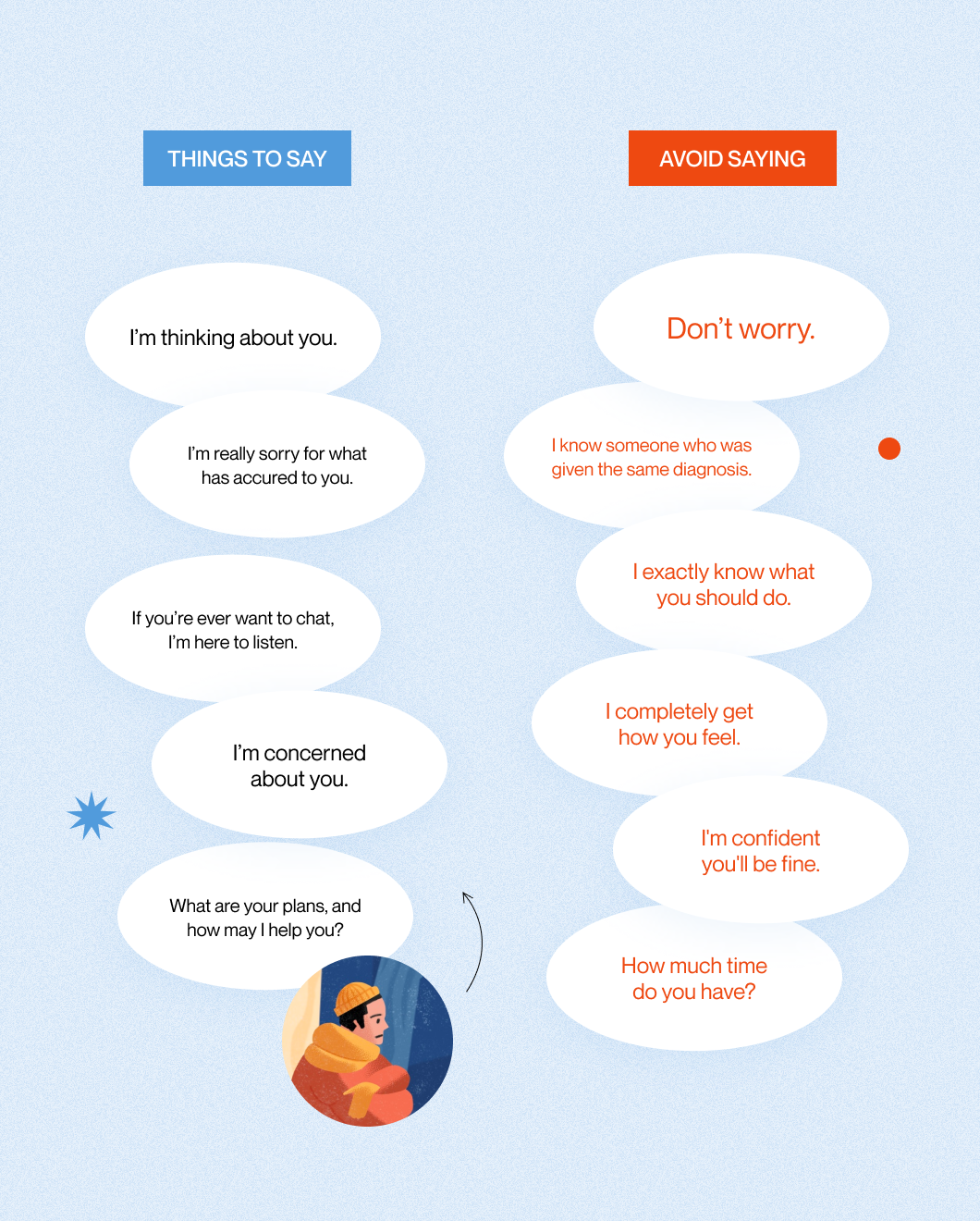A cancer diagnosis might cause feelings of despair, anger, perplexity, and helplessness. It is beneficial for the individual who has been diagnosed with cancer when friends and family members give a reassuring presence as well as practical assistance. It is frequently difficult for others to know what to say or how to begin a conversation with a cancer patient. However, being in touch is always preferable to being apart. Here are several ideas to express your support:
Take advice from the cancer patient.
Ask the cancer patient if they want to share their experience. It’s best to let him or she determine when and how much to reveal.
Show your support without using words.
Your body language and facial expressions can also provide a message of compassion and support. Maintain eye contact, listen carefully, and avoid distractions when speaking. Sharing some stillness without trying to drown it out with conversation is a vital way to offer support.
Choose your words wisely.
Make a point of acknowledging how hard this experience is for the individual. Selecting your words carefully might help you convey your support without being dismissive or ignoring the subject. For example, it is preferable to say, “I don’t know what to say,” rather than refrain from contacting or visiting out of fear.
Active listening should be practiced to demonstrate respect.
It is a useful technique for you to demonstrate that you are responding to the person’s words and feelings. To be an engaged listener, offer your complete attention, avoid thinking about what to say next, and avoid speeding or driving the discussion to a conclusion.
Be cautious when asking questions.
Consider how you phrase your queries and the number of questions you ask in a discussion. Cancer patients are frequently bombarded with inquiries from friends and family members, which may be exhausting.
Check to see if it is appropriate to offer suggestions.
Before you provide any advice, ask whether it is appropriate to do so, and be prepared to quit if you are not encouraged to do so. If you feel compelled to make a proposal, seek permission from the person before proceeding. Unsolicited counsel might add extra stress to your life.
Be open about your emotions, but don’t overload.
Communicate any sentiments you may be having in reaction to the person’s cancer diagnosis, such as worry, anxiety, anger, or denial. However, try to keep your explanations short. Spending too much time expressing uncomfortable feelings may overwhelm and distress the cancer patient. If you find it difficult to keep your cool, take some time away from the situation to allow your emotions to settle before speaking again. Meeting with a counselor may help you analyze and manage your emotions.
Discuss issues other than cancer.
Talking about common themes might assist to restore balance. The goal is not to divert your friend or family member, but to assist him or her in maintaining normal interests and relationships while taking a vacation from uncomfortable talks.
Encourage your loved one to stay active.
Assist your friend or family member in determining how to keep active in his or her usual activities and maintain old habits. These measures assist many cancer patients in coping during a period of many unusual experiences. However, a lack of time or energy caused by cancer or its treatment may prohibit some individuals from participating in their typical hobbies and routines. You may be able to assist your friend or family member in prioritizing their activities and delegating other responsibilities. You might, for example, recommend that your friend or family member conserve energy by attending his or her child’s soccer game or school play while asking volunteers to assist with domestic tasks.
Consider whether practical assistance would be beneficial.
Give clear instances of how you may assist patients undergoing cancer treatment. Inquire whether those recommendations sound useful. Running errands, caring for pets, taking the person to an appointment, or collecting up children from school are all possibilities. This approach is preferable to state, that they should let you know if they needed any help because some individuals have difficulty asking for assistance. If a large number of friends and family members agree to assist, you may offer to manage everyone’s work.

